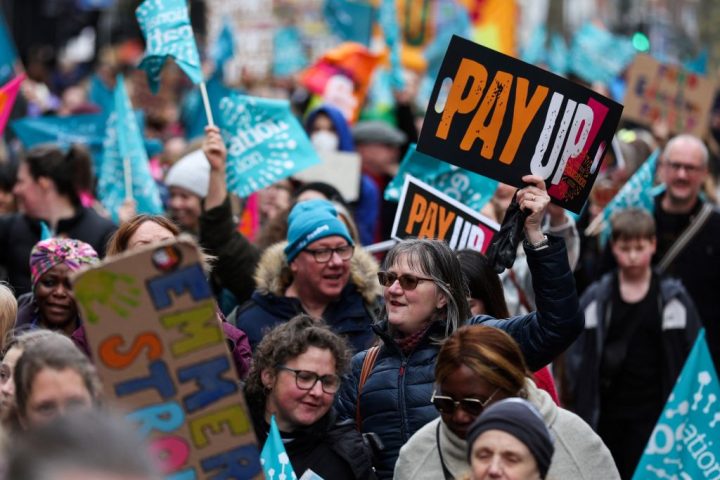The National Education Union’s (NEU) mask slipped last month when four of the organisation’s senior figures published a new book, Lessons in Organising: What Trade Unionists Can Learn from the War on Teachers. It was endorsed by the NEU’s general secretary, Kevin Courtney, who called it ‘an excellent review of the attack on teachers and their unions, by authors well placed to point to ways to improve the fight back and resistance’.
The book confirms that the union’s priorities lie far from their members’ pay and workload, which they describe as ‘narrow issues’. Instead, the NEU’s leadership appears to be dedicated to fighting the ‘multiple oppressions of capitalism’ and transforming the union into a body that aims to ‘explicitly confront the corrosive nature of neoliberal ideology’.
This astonishingly open self-revelatory tome should be a wake-up call for government engagement with the NEU
As a member, for some years, of the civil service union, the FDA, I have more time for public sector unions than many on the right. I even went on strike in 2011, walking out over retrospective changes to pensions.
When your pay is set annually by the Chancellor of the Exchequer, precluding any possibility of asking your boss for a pay rise (or their discretion to give you one), there’s a genuine case as to why collective bargaining is needed. The best public sector unions focus on their core mandate, putting the pay and conditions of their members first and staying out of wider ideological struggles.
With teacher strikes due to take place this Thursday, the new NEU book shows, in its leaders’ own words, just how far the union has slipped from that ideal. The authors admit the current strikes are not just about pay, but rather that ‘the labour movement needs to engage in its own war of position… to build working-class power by acting industrially and politically, organising at the workplace, but also in political and civil society’. They argue that ‘workers must wage a sustained political struggle in order to change the wider context… embracing workers’ struggle in all spheres’.
For all the public talk of wanting a deal, the book talks glowingly of ‘the fundamentally antagonistic relationship between employer and employee’, and that ‘capitalism oppresses and exploits workers in and out of the workplace’. It also argues that ‘rapprochement… is a dead end. It is the approach that has dominated trade unionism in the UK for 40 years since the 1980s (and indeed well before that) and which has delivered little’.
This is the language of Clause 4, of the Glasgow dockers, of the Militant tendency – about as far from the measured, professional visage that much of the public would associate with teachers as one could imagine.
The authors’ revelations about Covid are particularly telling. It became clear, as the pandemic progressed, that whatever they might claim, in practice the NEU did not prioritise the education or welfare of children. They systematically opposed efforts to reopen schools and simultaneously opposed measures by government to send materials home or teach online on the basis of concerns for its members.
Many individual teachers and school leaders worked incredibly hard, putting in sterling efforts during impossible times. But the damage done to children – from their educational progress to mental health – by school lockdowns is hard to describe, potentially wiping out a decade of progress on social mobility in two bleak years.
Now, it is revealed that, while families were struggling and children were losing out on education, the NEU’s leadership saw the pandemic as an ‘opportunity to radically reimagine the future’. They boast that the Covid crisis ‘was a decisive moment when the consciousness of school staff shifted…. staff who had never been in the union joined in their thousands…’
They boast that ‘educators inflicted numerous defeats on government’. In a potential admission that their actions were based on ideology they also boasted that this ‘demonstrated what is possible when grassroots organising integrates industrial and political dimensions with explicit ideological struggle’.
There are dozens of other examples. The book boasts of what it calls the union’s ‘deliberate targeting of Gove’ and its fundamental opposition to arguably many of the most effective educational reforms that have improved the lives of children and seen disadvantaged children in many of our state schools receiving an education that now rivals that received in the private sector.
It argues that ‘the counter-hegemonic fight needs to take place across three terrains: the ideological, the political, and the industrial/economic’. It should be noted that industrial action to achieve wider political goals, rather than as a legitimate dispute about pay and conditions, is unlawful in the UK.
This astonishingly open self-revelatory tome should be a wake-up call for government engagement with the NEU. While productive discussions can often be held with public sector unions, including other teaching unions, it is clear that the commitment to ideological struggle has deep roots in the NEU.
The NEU posits that by destroying the neo-liberal exam factory approach can children’s welfare be secured. There will however be many who feel the more influence the union has over national education policy, the worse the outcomes will be for children.
As teachers go on strike this Thursday, we should remember that the ultimate cause for some of those at the heart of the NEU’s leadership may not be not the best interests of children, nor even the working conditions of their members. But perhaps rather they want to ‘[develop] mass collective action towards achieving political goals.’






Comments